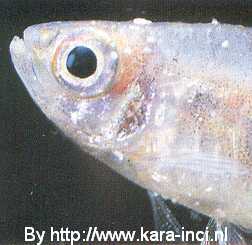 Groot verdriet in huize Klein Haneveld... Of in elk geval in mijn grote aquarium (Rio 240). Al een paar weken had mijn mannetje Aequidens curviceps nogal enge gaten in zijn kop en bij zijn rugvin. Het zag er echt heel naar uit, maar ik kon hem niet te pakken krijgen om hem eruit te vangen. Dat heb je als je een aquarium hebt vol planten, met tal van schuilplaatsen voor een vis om zich te verbergen. Pas gisteren kon ik hem in mijn net krijgen.
Groot verdriet in huize Klein Haneveld... Of in elk geval in mijn grote aquarium (Rio 240). Al een paar weken had mijn mannetje Aequidens curviceps nogal enge gaten in zijn kop en bij zijn rugvin. Het zag er echt heel naar uit, maar ik kon hem niet te pakken krijgen om hem eruit te vangen. Dat heb je als je een aquarium hebt vol planten, met tal van schuilplaatsen voor een vis om zich te verbergen. Pas gisteren kon ik hem in mijn net krijgen.Ook zag ik de laatste tijd mijn Pristella maxillaris
(klein scholenvisje) exemplaren met zwarte vlekken in hun lichaam. En het schooltje was afgenomen van elf tot zeven (hoewel ik geen dode visjes heb gezien. Dat zegt echter niks).
Vervolgens vond ik eerder deze week mijn algenetende meerval Ancistrus species dood, totaal verbleekt, maar zonder duidelijke ziektesymptomen.
En gisteren ontdekte ik witte stip bij mijn nieuwe bijlzalmpjes en een paar van de Pristella's. Het is gelukkig de meest voorkomende (bij mij althans) en makkelijkst herkenbare visziekte: mooie grote witte punten (zie de foto). Direct maar behandeld met vismedicijn Esha 2000 en nu maar hopen op een goede afloop.
Het nadeel van behandelen met medicijnen is dat ook gunstige bacteriën en micro-organismen heer natuurlijk een klap van zullen krijgen. En ik heb de gunstige beestjes juist hard nodig: deze week zat er namelijk ook weer blauwe alg (cyanobacteriën) in mijn aquarium. Dit is wel de meest vervelende algensoort die ik ken. Ik heb er het hele eerste jaar dat ik mijn aquarium had last van gehad, en heb een tijd lang elke dag water ververst. Dat herhaal ik liever niet. Ik vermoed dat ik er de laatste tijd weinig vissen in mijn aquarium zitten en dat ik te weinig voor. Daardoor is de hoeveelheid nitraat en fosfaat weer sterk afgenomen. Ik zie het ook aan de hele lange (50cm) wortels van de oppervlakteplanten in mijn aquarium. Die hadden eerst worteltjes van vijf centimeter, maar nu moeten ze kennelijk meer moeite doen aan voeding te komen. Als er weinig nitraat en fosfaat inzit kan het evenwicht makkelijk naar één van beide kanten doorslaan. Heb je te veel nitraat dan komt er snel draadalg, bij te veel fosfaat blauwe alg. De truuk is om het juiste evenwicht te vinden. Dat was me goed gelukt het laatste half jaar, maar het ziet er nu weer wat somberder uit.
Heeft dit iets met verlangen te maken? Niet direct natuurlijk. Maar ik denk dat iedereen dit soort frustraties wel herkent. Heb je net je auto door de APK-keuring gekregen, word je van achteren aangereden... Verheug je je op een lange vrije avond, hebben de treinen meer dan een uur vertraging... Lukt het je eindelijk om met vrienden iets af te spreken, komt er iemand niet opdagen... En groter: net als we ons huis hebben gekocht, staat onze baan op het spel. Net als we denken het rustig aan te kunnen doen, zien we lekkage in de badkamer. Net als we tevreden zijn, sterft een geliefd familielid. Het lijkt een patroon, een patroon waar niemand aan ontsnapt.
De bijbelse Prediker zei het al: 'Tijd en toeval treffen allen'. Zo is het. En Jezus waarschuwde ons dat we niet teveel waarde moeten hechten aan dingen op aarde "waar mot en roest ze aantasten en waar dieven inbreken en ze stelen"(Mattheus 6 vers 19). Volgens Paulus is de schepping "veroordeeld tot een zinloos bestaan" (Romeinen 8 vers 20). Dat is wat we bijna dagelijks merken. En dat is waarom ik niet kan verwachten dat mijn aquarium altijd zonder problemen blijft functioneren. Maar er is hoop! Het laatste vers wordt gevolgd door een belofte: "Ook de schepping zal bevrijd worden uit de slavernij van de vergankelijkheid en delen in de glorierijke vrijheid van de kinderen van God!"
En dat is waar we naar verlangen, het moment "waarop God ons voorgoed tot zijn kinderen maakt en ons hele bestaan bevrijdt" (Romeinen 8 vers 23). Ik verlang er in elk geval wel naar, "zuchtend" in de woorden van Paulus. En de wetenschap dat de toestand van verval niet de bedoeling is, geeft me kracht om vol te houden. Dat is de functie van hoop.
Voor meer informatie over visziekten (en gruwelijke foto's van zieke vissen), bezoek deze informatieve website.
[Despair hit family Klein Haneveld... or at least my large fishtank (Rio 240). For a couple of weeks my male Aequidens curviceps showed some rather disturbing holes in his head and at his dorsal fin. It was really gross, but I wasn't able to catch him. That is the consequence of having a tank full of plants and lots of places to hide for a ill fish. Only yesterday I caught him in my net.
Furthermore in the past weeks I idintified large black spots in the body of my Pristella maxillaris , a small tetra. And the group was reduced from eleven to seven individuals, even though I didn't spot dead ones.
And last week my algue eating catfish Ancistrus species has died. He was almost white, but I did not find clear symptoms.
To top it off, yesterday I saw an infection of ichthyosporidium (white spot sickness) with my new hatchetfish and some of the Pristella's. Luckily it's the most frequent (with me) disease for fish, and the easiest to recognize: white spots over the body (see photograph). So I started treating with Esha 2000 directly. Now I have to hope it will all heal properly.
The downside of treating with medicines is that they also hit the healthy bacteria and microbes. And I do need the healthy microbes now more than ever: this week I also saw blue algaes in my tank. This is the worst species of algae I know. I struggled with it for the whole first year I've had this tank and for a long time I had to clean every day. That's something I'd rather not have to repeat. I suspect that the past few months I've fed my fish too little (and had too little fish), and that made the levels of Phosphate and Nitrate plummet. Another symptom are the very long roots of some of the floating plants, up to 50 cm. These plants had roots of 5 cm or less ofr a long time, but now they have to work harder to find their nutrition. The problem with so little phoshate and nitrate is that the balance is more easily disturbed. And with too much nitrate green algae prosper, with too much phospate it's the blue algae that grows. The trick is to find the right balance. And I had found it for the past half year, but now the prospect is a little darker.
Does this all have something to do with desire? Not directly, but I think that everyone recognizes frustrations of this kind. You just repaired your car and it's hit from behind... You look forward to an evening for yourself and the train home arrives an hour late. You finally manage to pick a date to meet old friends and someone can't make it... And in larger matters: just when we bought our house our jobs are on the line. Just when we think we can relax there's a leakage in the bathroom. Just when we are happy, a familymember dies. It seems like a pattern, a pattern no-one can escape from.
The book of Ecclesiastes already proclaimed: 'Time and coincidence get to everybody'. That's the way of things. And Jesus warned us to not give too much attentions to things on earth "where moth and rust destroy, and where thieves break in and steal" (Matthew 6 verse 19) According to Paul the whole of creation is "subjected to frustration" (Romans 8 verse 20). That is something we experience almost daily. And that's why I can't expect my fishtank to do well without problems. But there is hope. The last verse is followed by a promise: "Creation itself will be liberated from its bondage to decay and brought into the glorious freedom of the children of God!"
That is what we look forward to, the moment of our "adoption as sons, the redemption of our bodies" (Romans 8 verse 23). At least I do desire that moment, "groaning" in Paul's words. And knowing that this condition of frustration was not the intention gives me strength to hold on. That's what hope's for.
More information about illnesses of fish on this informative website.]

No comments:
Post a Comment